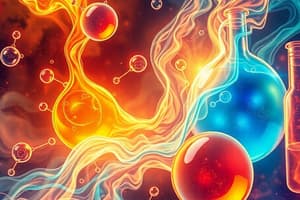Podcast
Questions and Answers
Which branch of chemistry deals with the study of compounds containing carbon-hydrogen bonds?
Which branch of chemistry deals with the study of compounds containing carbon-hydrogen bonds?
- Organic chemistry (correct)
- Analytical chemistry
- Physical chemistry
- Inorganic chemistry
What are substances that have the ability to donate or accept protons known as in the field of inorganic chemistry?
What are substances that have the ability to donate or accept protons known as in the field of inorganic chemistry?
- Coordination Compounds
- Acids and Bases (correct)
- Salts
- Oxides
Which type of compounds do not contain carbon-hydrogen bonds according to the text?
Which type of compounds do not contain carbon-hydrogen bonds according to the text?
- Hydrocarbons
- Alcohols
- Acids and Bases
- Salts (correct)
What are coordination compounds in the context of inorganic chemistry?
What are coordination compounds in the context of inorganic chemistry?
Which category of chemistry involves the study of compounds like acids, bases, salts, and oxides?
Which category of chemistry involves the study of compounds like acids, bases, salts, and oxides?
Which group of compounds is classified into three main groups based on the number of carbon atoms attached to the hydroxyl group?
Which group of compounds is classified into three main groups based on the number of carbon atoms attached to the hydroxyl group?
What kind of chemical reaction involves one reactant forming two or more products?
What kind of chemical reaction involves one reactant forming two or more products?
What is the molecular formula for the reaction between sodium (Na) and chlorine (Cl) to form sodium chloride (NaCl)?
What is the molecular formula for the reaction between sodium (Na) and chlorine (Cl) to form sodium chloride (NaCl)?
Which law states that the total mass of reactants is equal to the total mass of products in a chemical reaction?
Which law states that the total mass of reactants is equal to the total mass of products in a chemical reaction?
What type of group within a molecule determines its chemical properties?
What type of group within a molecule determines its chemical properties?
Study Notes
Chemistry
Chemistry is a branch of science that deals with the identification, extraction, and analysis of substances from natural sources, as well as the synthesis of new substances in the laboratory. It is a vast field that can be divided into two main categories: inorganic chemistry and organic chemistry.
Inorganic Chemistry
Inorganic chemistry is the study of compounds that do not contain carbon-hydrogen bonds, such as acids, bases, salts, oxides, and many other substances. Some of the key topics in inorganic chemistry include:
-
Acids and Bases: These are substances that have the ability to donate or accept protons. Acids donate protons, while bases accept protons.
-
Salts: These are ionic compounds that consist of a positive ion (cation) and a negative ion (anion). Examples include sodium chloride (NaCl) and potassium sulfate (K2SO4).
-
Oxides: These are compounds that contain oxygen in their molecules. Examples include water (H2O), carbon dioxide (CO2), and oxides of nitrogen (NOx).
-
Coordination Compounds: These are compounds in which a central metal atom or ion is surrounded by ligands, which can be molecules, ions, or atoms.
Organic Chemistry
Organic chemistry is the study of compounds that contain carbon-hydrogen bonds, such as hydrocarbons, alcohols, acids, and many other substances. Some of the key topics in organic chemistry include:
-
Hydrocarbons: These are compounds that contain only carbon and hydrogen atoms. They are classified into two main groups: aliphatic hydrocarbons (e.g., ethane, propane) and aromatic hydrocarbons (e.g., benzene, toluene).
-
Alcohols: These are compounds that contain a hydroxyl (-OH) group. They are classified into three main groups: primary alcohols (e.g., methanol, ethanol), secondary alcohols (e.g., 2-propanol), and tertiary alcohols (e.g., 2-methyl-2-propanol).
-
Acids: These are compounds that can donate protons. They are classified into two main groups: organic acids (e.g., acetic acid, citric acid) and inorganic acids (e.g., hydrochloric acid, sulfuric acid).
-
Functional Groups: These are groups of atoms within a molecule that determine its chemical properties. Examples include the alcohol group (-OH), the aldehyde group (-CHO), and the carboxylic acid group (-COOH).
Class 10
In Class 10, students are introduced to the basic concepts of chemistry. They learn about different types of chemical reactions, such as combination reactions (where two or more reactants form one product), decomposition reactions (where one reactant forms two or more products), and single displacement reactions (where a metal reacts with a non-metal to form an ionic compound).
Students also learn about molecular formula, which is the chemical equation that shows the chemical reaction between two or more substances. For example, the chemical equation for the reaction between sodium (Na) and chlorine (Cl) to form sodium chloride (NaCl) is:
$$ 2 \text{Na} + \text{Cl}_2 \to 2 \text{NaCl} $$
In addition, students learn about the Law of Conservation of Mass, which states that the total mass of reactants (the substances that start the reaction) is equal to the total mass of products (the substances that end the reaction). This law helps chemists understand the relationships between the different elements that make up the substances they are studying.
Conclusion
Chemistry is a fascinating field that explores the properties and behavior of substances at the atomic and molecular levels. By studying inorganic and organic chemistry, as well as the concepts introduced in Class 10, we can gain a deeper understanding of the world around us and the substances that make up our everyday lives.
Studying That Suits You
Use AI to generate personalized quizzes and flashcards to suit your learning preferences.
Description
Explore the fundamental concepts of inorganic and organic chemistry, including acids, bases, salts, hydrocarbons, alcohols, and more. Learn about the basic principles introduced in Class 10, such as chemical reactions, molecular formula, and the Law of Conservation of Mass.




